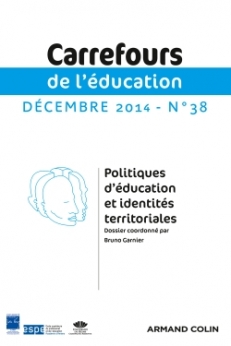
Carrefours de l'éducation n° 38 (2/2014)
Pour acheter ce numéro, contactez-nous
Recevez les numéros de l'année en cours et accédez à l'intégralité des articles en ligne.
Construction d’une identité nationale biélorusse au prisme de la politique éducative Le présent article est consacré à la construction d’une identité nationale biélorusse à travers la politique éducative et, plus particulièrement, de l’enseignement scolaire de l’histoire. Nous insistons sur l’emploi de l’article indéfini devant le terme d’identité, car la mise en place des liens d’identification qui lient l’individu à différents groupes est toujours dynamique et plurielle. La production du sentiment d’adhésion à un groupe est souvent tributaire du travail d’identification opéré par l’État national à travers la politique éducative. En étudiant l’évolution de la politique éducative se rapportant aux disciplines majeures pour la construction identitaire, comme l’histoire nationale, nous analyserons l’éducation à l’identité dans le contexte biélorusse. Cette évolution est analysée à travers trois périodes de la politique éducative biélorusse : la période soviétique, la perestroïka et la période actuelle. Les transformations de la politique éducative, reflétées par les manuels scolaires et notamment dans les manuels scolaires d’histoire feront l’objet d’une analyse particulière. L’examen des résultats de recherches sociologiques récentes portant sur l’identification des Biélorusses confirme l’hypothèse du rôle majeur de la politique éducative dans la construction des liens d’identification entre les membres d’une nation.
The Construction of a Belarusian National Identity Seen Through the Prism of Education Policy This paper focuses on the construction of a Belarusian national identity through education policy, and more particularly the teaching of history in school. We insist on the use of the indefinite article before “identity” because the way the identifications that link an individual to different groups is put in place is always plural and dynamic. The production of a feeling of belonging to a group is often a function of the work of identification brought about by a nation-state through its educational policies. In studying the evolution of educational policy in respect of the disciplines central to the construction of identifications, such as national history, we will analyse identity education in the Belarusian context. This evolution is studied over three historical periods: the Soviet period, perestroika, and the present situation. The changes in educational policy as reflected in textbooks are the object of particular analysis. The study of recent sociological research regarding the ways Belarusians identify confirm our hypothesis of the major role played by educational policy in the construction of identity bonds between the members of a nation.